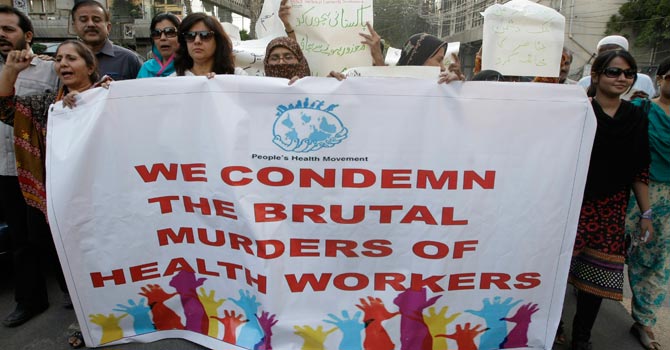
The fund for Polio began about as early as 1930 when the Rotary Foundation made its first donation of $500 to the International Society of Crippled Children.
In 1948 Hilary Koprowski tested the Polio vaccine on himself and a year later David Bodian found three types of Polio virus.
In 1950 Koprowski carried out the first human trial of his unusually thinned oral polio virus vaccine. He tested his vaccine on 20 children and demonstrated how none of them fell prey to the contagious virus and they all developed Type II polio virus antibodies.
Around 1960 Albert Sabin’s live polio virus vaccine and became licensed with the official approval of the US Surgeon General. This vaccine protected against Type I polio virus. By 1963 the vaccines for Types I, II and III would be combined into one.
The Health, Hunger and Humanity Grant was launched in 1978 and as an offshoot of that program Rotary Volunteers were created in 1980.
PolioPlus began in 1985and has contributed the most significantly towards the eradication of polio globally. In 1988the World Health Assembly launched a global polio eradication program. At that point in history, polio was an endemic in around 125 countries. The aim was to eradicate the disease by the new millennium.
On August 20, 1994 it was officially declared that polio had been eradicated from the Americas.
Despite the dedication towards the elimination of poliovirus, it remains a formidable threat in Pakistan. In 1994 National Immunization Days (NID’s) were initiated in which all children aged less than five years of age were given oral polio virus vaccines (OPV3).Since then 20 million children have been vaccinated each year.
In 1997 we reported 1147 cases of polio and constituted of a hefty 22 per cent of the cases reported globally.
Surveillance data declined from 1147 in 1997 to 28 in 2005.
However, since 2007 there has been a significant relapse of polio cases throughout the nation. The parents of 24,000 children in northern Pakistan refused to have their children vaccinated against the virus. Mostly because it was alleged that the vaccine was an American plot to sterilise Muslim children.
Maulana Fazlullah in Swat denounced the polio campaign through a regional radio channel and as a consequence, around 4,000 children were not vaccinated in that area. Aside from this, extortionate demands were made, policemen demanded their salaries and other villagers asked that some prisoners be released from jail and in return children would be allowed to be vaccinated. In February 2007 a grenade was aimed at the Red Crescent compound in Peshawar, damaging vehicles but otherwise without casualties.
In 2010 there were 144 children across Pakistan that were paralyzed due to the virus, over half of which were from FATA and seventeen per cent from Khyber-Paktunkhwa. On 25thJanuary, 2011, President Zardari initiated a National Emergency Action Plan for Polio Eradication. According to the UN the polio elimination campaign was further hindered by Heidi Larson’s article in The Guardian pointing out that the CIA had used fake Hepatitis vaccination campaign to nose out the location of Osama Bin Laden in Abottabad, early in 2011.
2012
March 2012:
The year began optimistically enough, with tribesmen playing football to raise awareness against polio but soon enough there were delays and boycotts. Due to superstitions and rumours the government was forced to draft a bill to enforce compulsory immunisation. Consistency in failures to meet targets caused WHO chief to visit Pakistan and it was seen as being directly correlated to Dr Afridi. However unity between Muslim clerics was shown against the war on polio on the 23rd of the month. Despite this, many protested that the polio vaccine be banned as it is unIslamic. This plea was turned down.
April 2012:
Alongside confusions about the number of children infected, there were other trials and tribulations as health workers threatened to boycott the polio drive over irregular salaries.
Across the border despite being declared polio free, India was told to stay cautious as the disease can never fully be eliminated. In Hyderabad a polio team was refused admission into a school.
May 2012:
Progress had further obstacles as a large majority of the Pakistani population was not even aware of the existence of a polio vaccine according to Unicef.
June 2012:
On top of this Taliban alleged that the polio drive was linked to the drone attacks instigating further setbacks. South Waziristan blatantly banned the polio drive. Some of the children that did manage to get vaccinated were given expired medication.
July 2012:
In Islamabad an anti-polio worker was attacked. A day later a UN doctor was shot in Karachi. However, Rawalpindi was declared polio-free.
August 2012
Saudi Arabia was asked to help Pakistan battle polio.
September 2012
September saw some sad statistics. Adding to that, even the children who had been vaccinated showed symptoms of the virus. People helping to battle polio’s lives came under threat, alongside a vaccinator being harassed.
October 2012
The kidnapping of an official’s son put the campaign in further perils. This was followed by another aggressive attack that resulted in the death of an anti-polio worker in Balochistan. In Lahore a bus terminal was sealed off due to another attack on a polio team.
November 2012
New strain of polio found in Pakistan.
December 2012

New strain of polio from Pakistan infects children in Afghanistan. Another polio worker is killed in Sohrab Goth. 9 polio workers were killed in Pakistan, 6 in Karachi and 3 in Peshawar. WHO and Unicef combined have about two thousand people who assist the polio teams in Pakistan. Regardless of this major set back, undeterred, polio teams are carrying forth with the immunization of the country. Muslim clerics have once again united to condemn the killings of the health workers.

However Balochistan suspended the polio campaign, but in Lahore efforts are persistent and police protection has been given to health workers.
Timeline drafted by Mehar Khursheed/Dawn.com










































